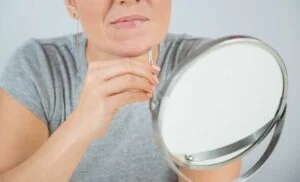Polycystic Ovarian Syndrome (PCOS) is a complex hormonal disorder affecting individuals with ovaries, and one of its common manifestations is hirsutism – the excessive growth of facial and body hair. For those grappling with this challenging symptom, the introduction of eflornithine represents a potential breakthrough. In this blog, we will delve into the specifics of eflornithine and its role in managing hirsutism in PCOS.
Understanding Hirsutism In PCOS
Hirsutism is a condition commonly associated with Polycystic Ovarian Syndrome (PCOS), where individuals, typically females, experience excessive and unwanted hair growth in areas where men usually grow hair, such as the face, chest, and back. This occurs due to high levels of androgens, which are male hormones that can cause an imbalance in PCOS. The excess androgens stimulate the hair follicles, leading to the growth of thicker and darker hair.
Hirsutism can be distressing for those affected, impacting self-esteem and well-being. While various treatments, including medications like eflornithine and hormonal therapies, can help manage the visible symptoms, addressing the underlying hormonal imbalances through lifestyle changes and medical interventions is often an essential part of a comprehensive approach to managing hirsutism in the context of PCOS. Individuals experiencing symptoms of hirsutism should consult with healthcare professionals for personalized advice and treatment options.
Contents
What is Eflornithine?
Eflornithine is a prescription cream used to address unwanted facial hair growth, especially in conditions like hirsutism, where individuals experience excessive and undesirable hair growth, often associated with hormonal imbalances such as those seen in Polycystic Ovarian Syndrome (PCOS). This cream works by inhibiting an enzyme called ornithine decarboxylase, which plays a role in the production of substances necessary for hair growth.
By slowing down this process, eflornithine provides a targeted solution to manage the visible symptoms. It’s important to note that while eflornithine addresses the symptom, it doesn’t directly tackle the underlying hormonal imbalances. Therefore, it is often used in combination with other treatments for a more comprehensive approach to managing conditions like hirsutism. As with any medication, individuals should consult with a healthcare professional before incorporating eflornithine into their skincare routine.
Benefits Of Eflornithine
Eflornithine, commonly known by its brand name Vaniqa, offers several benefits for individuals dealing with unwanted facial hair, especially in conditions like hirsutism associated with hormonal imbalances such as Polycystic Ovarian Syndrome (PCOS). Here are some key benefits of eflornithine:
- Targeted Approach: Eflornithine provides a localized and targeted solution for managing unwanted facial hair. Applied directly to the affected areas, it focuses on inhibiting the enzyme responsible for hair growth, ensuring a precise and specific action.
- Reduction in Hair Growth Rate: The primary mechanism of eflornithine involves slowing down the rate of hair growth at the cellular level. This results in a visible reduction in the speed of hair growth, offering individuals an effective means to manage it.
- Convenience and Reduced Maintenance: Unlike traditional hair removal methods that require frequent upkeep, eflornithine users may experience a decrease in the frequency of hair removal. This contributes to convenience and a more relaxed skincare routine.
- Improved Confidence: Managing unwanted facial hair can significantly impact self-esteem and confidence. By effectively reducing the visible signs of hirsutism, eflornithine contributes to improved self-image and a positive impact on overall well-being.
- Prescription-Based and Supervised Use: Eflornithine is a prescription-based medication, ensuring that its use is supervised by healthcare professionals. This regulatory oversight enhances safety and effectiveness, as individuals receive personalized advice based on their health history and specific circumstances.
- Minimization of Side Effects: Eflornithine is generally well-tolerated, with side effects being mild and transient in most cases. Skin irritation or acne formation may occur in some individuals, but these effects are often manageable and temporary.
- Scientifically Validated Efficacy: Eflornithine’s efficacy in managing unwanted facial hair has been scientifically validated through clinical studies. This evidence-based approach reinforces its status as a reliable and effective solution for individuals seeking to address hirsutism.
Side-Effects Of Eflornithine
Eflornithine is generally considered safe for topical use, but like any medication, it may cause side effects in some individuals. It’s essential to be aware of potential side effects and consult with a healthcare professional if any concerns arise. Common side effects of eflornithine cream may include:
- Skin Irritation: Some individuals may experience mild skin irritation, redness, or a stinging sensation at the application site. This is usually temporary and tends to subside with continued use.
- Acne or Pimple Formation: In some cases, eflornithine may lead to the development of acne or pimples. If this occurs, it’s advisable to inform a healthcare professional for guidance.
- Hair Follicle Ingrown: Eflornithine may contribute to the occurrence of ingrown hairs. If individuals notice this side effect, it’s important to discuss it with a healthcare provider.
- Headache: Although uncommon, some individuals may experience headaches as a side effect of eflornithine. If headaches persist or become severe, it’s important to seek medical advice.
- Allergic Reactions: While rare, allergic reactions such as rash, itching, or swelling may occur. If any signs of an allergic reaction manifest, including difficulty breathing, swelling of the face or throat, or severe rash, immediate medical attention is necessary.
It’s crucial for individuals using eflornithine to follow the prescribed application instructions and report any unusual or persistent side effects to their healthcare provider. Additionally, individuals should inform their healthcare professionals of any other medications, topical products, or skincare routines they are using to avoid potential interactions.
Solutions For Hirsutism
Hirsutism, the excessive growth of hair, can be a challenging symptom for individuals, often associated with PCOS. Here are some solutions for managing hirsutism:
- Hormonal Treatments: Hormonal treatments play a significant role in managing hirsutism, especially in the context of conditions like PCOS. Birth control pills containing estrogen and progestin are commonly prescribed to regulate hormonal imbalances. Anti-androgen medications, such as spironolactone, act by blocking the effects of male hormones, offering another effective approach to managing excessive hair growth.
- Lifestyle Changes: Lifestyle modifications can have a meaningful impact on hirsutism. Achieving and maintaining a healthy weight is crucial, as obesity can exacerbate hormonal imbalances. A balanced diet, rich in whole foods like fruits, vegetables, lean proteins, and whole grains, supports overall health.
- Hair Removal Methods: Various hair removal methods offer solutions for managing unwanted facial hair. Shaving, a quick and accessible option, provides temporary results by cutting hair at the skin’s surface. Waxing and depilatory creams, in contrast, remove hair from the root, offering longer-lasting results compared to shaving. Laser hair removal uses technology to damage hair follicles, inhibiting future growth and providing enduring relief from hirsutism.
- Consultation with Healthcare Professionals: Specialists in endocrinology can assess hormonal imbalances by conducting hormone tests. They can prescribe appropriate medications and treatments to address the root causes of hirsutism.
- Mind-Body Practices: Chronic stress can exacerbate hormonal imbalances, contributing to hirsutism. Practices such as yoga, meditation, or deep breathing exercises may help reduce stress and promote overall well-being.
- Support Groups: Connecting with support groups or online communities focused on PCOS and hirsutism can provide individuals with a platform to share experiences, gain insights, and receive emotional support. It can be valuable to learn from others who have successfully managed similar challenges.
Conclusion
In conclusion, the introduction of eflornithine, particularly in the context of managing unwanted facial hair in individuals with conditions like Polycystic Ovarian Syndrome (PCOS), marks a significant stride in dermatological solutions. Its mechanism of inhibiting the enzyme responsible for hair growth allows for a precise and localized action, contributing to a reduction in the rate of hair growth. The convenience of reduced maintenance, coupled with the potential for improved confidence and self-esteem, makes eflornithine a valuable addition to skincare routines for those navigating the challenges of unwanted facial hair.
While considerations and supervision by healthcare professionals are crucial, the scientifically validated efficacy of eflornithine reinforces its role as a reliable solution in the comprehensive management of hirsutism, providing individuals with a practical means to enhance their overall well-being.





